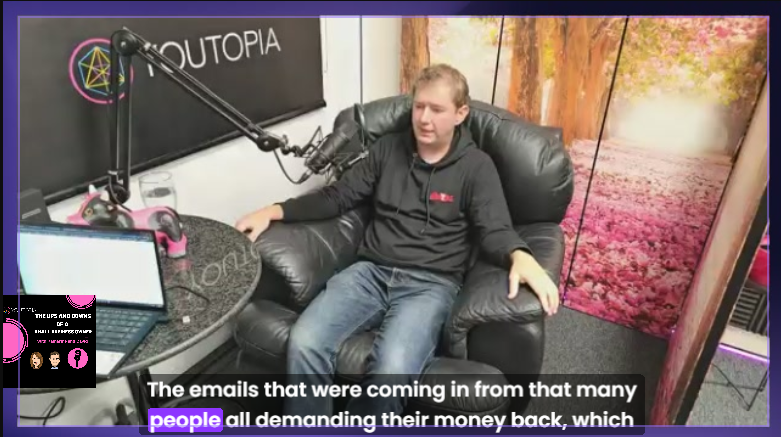December 21 Newsletter
Business Update

How to properly switch off over the Christmas break.
Taking time off to recharge your batteries is essential for business.
During normal times, it can give you the boost of energy that you need to keep going and it can take your business from just ticking along to motoring along. So imagine what a break can do now when everybody needs it more than ever?
We all need a complete and utter break from the stress of 2020. This means no checking emails over the holidays or taking the odd phone call. We all need proper time off to give our mind and our body the break that they deserve.
So how do you do it? How do you truly take a break from the business?
8 ways to switch off and recharge
1. Prepare for the break and plan ahead
– tie up any loose ends before you leave for the Christmas break and on your last day, take some time to organise yourself for your first day back. Not only will this help you switch off (because you have written down the things that you
need to do), but it will also help you hit the ground running on your first day back.
2. Anticipate which clients will have urgent queries
– think about who will be most likely to have an urgent query whilst you’re away and call them up. Make them aware that you will be away and for how long and ask them if they need anything before this. Do the same with clients who will need work done before you’re away.
3. Manage expectations
– the best way to have time off is to ensure that you won’t get interrupted and dragged back into work. You can do this by setting expectations with your team and your clients before you leave. Let them know when the business is closed and that you are
planning to switch off. Let your team know when you are completely out of action and if or when you may be available to dip into work.
4. Sort out your mindset
– some business owners have fears about taking time off such as “will I lose clients if they can’t get in touch with me over this period?” If you have certain worries that prevent you from completely switching off, work through these beforehand. For every worry you identify, think of a rational response to repeat to yourself. For example, repeating something like “good clients who really want to work with us will wait to speak to me” is a great way to put your mind at rest.
5. Leave your work at work
– a really simple way to switch off is to leave your laptop and anything you associate with work at work. That way, you won’t be tempted to pick these up when you’re taking a break. Even if you are working from home, leave your laptop and any devices in a room where you can close the door and signal to your mind that you’re now in rest mode.
6. Step away from your devices
– our phones, laptops, and iPads have become consumed by our work, so whatever you check your emails on or the news or social media, step away from them. Limit how many times you pick them up a day if you need to. It might be hard at first, but you’ll feel so much better for it. (Tip: if it is too hard, take your email off your phone or get a team member to change your password and not tell you what it is).
7. Be present
– easier said than done I know, but it’s essential for you to switch off mentally as well as physically. Try to enjoy your time off. Really focus on the people you’re with and engage in meaningful conversations. Take time to smell your coffee in the morning and notice the simple parts of your day that you’re grateful for. Not only will this help you to spend quality time
with your loved ones, but it will also help you to be more mindful moving forward too.
8. Relax and take it easy
– it’s been a long and difficult year and the business will be waiting for you when you get back to work, so take this time to relax. Take the opportunity to recharge while you can and do things that you normally can’t do because you’re too busy.
We all need this break to prevent burning out so use it. Tie up as many loose ends as you can beforehand, limit distractions, and focus on relaxing and enjoying the festivities. You deserve it.
Accounting Update

Tax Returns - deadline approaching!
HMRC are encouraging the early filing of self-assessment returns. They are also reminding companies that tax is due on coronavirus grants.
Declaring coronavirus grants on company tax returns
Coronavirus grants to support businesses during the pandemic are taxable. If a business needs to complete a company tax return (CT600) and has claimed grants from the Coronavirus Job Retention Scheme (CJRS) or any payments made by local authorities, they’ll need to report this as income when they calculate their taxable profits.
Self Assessment - Covid-19 support grants
HMRC has already seen thousands of people filing their returns early - more than 63,500 customers filed their tax return on 6 April, the first day of the tax year.
This year Self Assessment customers must declare if they received grants or payments from COVID-19 support schemes up to 5 April 2021 as these are taxable. This includes grants or payments from:
● The self-employment income support scheme (SEISS) ● The Coronavirus Job Retention Scheme (CJRS) ● Other local authority grants.
HMRC recommends customers start gathering the necessary information together now to make sure there’s enough time to check it is correct and to avoid delays. Please remember the self-assessment deadline for 20/21 is 31st January 2022.
App of the month

We use "UseComma" to support bulk payments straight from Xero, its very easy to use and has great results.
Bulk pay the boring stuff
A safe and secure app that pays bills, taxes and salaries for accountants and small businesses. Click once, pay everyone.
Make payday a breeze
Custom payments for payroll lets you process salaries, taxes and pension contributions all at once. You can even future date the payment so you’re always ahead of the curve. Nice.
Goodbye red tape, hello Comma
We’ve given bulk payments a 21st century makeover. Comma fetches payment data, you select what needs to be paid, Comma makes payments from your account. No risk, no transaction fees.
We’d bet our house on it
We’ve gone full GCHQ on security. Whether it's face ID on a mobile app or PIN entry on a desktop, no-one gets into Comma unless you say so.
Friends with Xero
Comma doesn’t leave your accounting software in the dark. As soon as payments are made, Comma updates everything. All synced and good to go
Team News
We have taken some time to look back over the past year and recognise that 2021 has been full of challenges, both for us and for our clients. We are extremely proud of our team and our clients, how they have adapted to ever changing rules, trading conditions and individual needs.
We will be closing our office from Christmas Eve and re-opening on Tuesday 4th January to enjoy a festive break with our families and friends. We hope that you will also enjoy a peaceful break.
Wishing you a Merry Christmas and a Happy New Year,
Katherine, David, Ben, Michelle and Thomas









